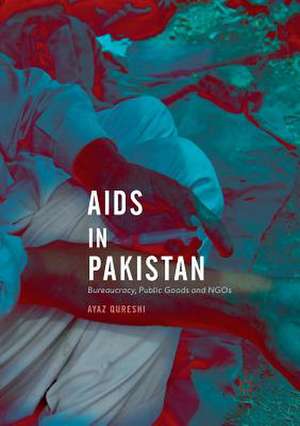AIDS in Pakistan: Bureaucracy, Public Goods and NGOs
Autor Ayaz Qureshien Limba Engleză Paperback – 26 ian 2019
Based on unparalleled ethnographic access to government bureaucracies and their dealings with NGOs, Qureshi examines how global policies were translated by local actors and how they responded to the evolving HIV/AIDS crisis.
The book encourages readers to reconsider the orthodoxy of policies regarding public-private partnership by critiquing the resulting changes in the bureaucracy, civil society and public goods. It is a must-read for students, scholars and practitioners concernedwith neoliberal agendas in global health and development.
| Toate formatele și edițiile | Preț | Express |
|---|---|---|
| Paperback (1) | 710.23 lei 6-8 săpt. | |
| Springer Nature Singapore – 26 ian 2019 | 710.23 lei 6-8 săpt. | |
| Hardback (1) | 716.09 lei 6-8 săpt. | |
| Springer Nature Singapore – 27 oct 2017 | 716.09 lei 6-8 săpt. |
Preț: 710.23 lei
Preț vechi: 747.61 lei
-5% Nou
Puncte Express: 1065
Preț estimativ în valută:
135.92€ • 141.04$ • 113.60£
135.92€ • 141.04$ • 113.60£
Carte tipărită la comandă
Livrare economică 15-29 martie
Preluare comenzi: 021 569.72.76
Specificații
ISBN-13: 9789811348303
ISBN-10: 9811348308
Pagini: 217
Ilustrații: XI, 217 p.
Dimensiuni: 148 x 210 mm
Greutate: 0.28 kg
Ediția:Softcover reprint of the original 1st ed. 2018
Editura: Springer Nature Singapore
Colecția Palgrave Macmillan
Locul publicării:Singapore, Singapore
ISBN-10: 9811348308
Pagini: 217
Ilustrații: XI, 217 p.
Dimensiuni: 148 x 210 mm
Greutate: 0.28 kg
Ediția:Softcover reprint of the original 1st ed. 2018
Editura: Springer Nature Singapore
Colecția Palgrave Macmillan
Locul publicării:Singapore, Singapore
Cuprins
Introduction.- Chapter 1: AIDS in the Islamic Republic.- Chapter 2: The HIV prevention market.- Chapter 3: Enterprising bureaucrats.- Chapter 4: Surviving hard times.- Chapter 5: Participating in the Global Fund.- Chapter 6: Responsibility for care and support.- Chapter 7: AIDS activism.- Conclusion.
Recenzii
“This ethnography has valuable insights for practitioners and academics, and it raises interesting comparisons for the rise and demise of other global health or development initiatives in Pakistan. … Qureshi's book will have wider resonance for studies of sexuality, law, public health, government, development, democracy and societal change in the Islamic Republic, and it deserves to be read widely.” (Nichola Khan, Bloomsbury Pakistan, April 10, 2018)
Notă biografică
Ayaz Qureshi studied Anthropology at the School of Oriental and African Studies, London, and is an Assistant Professor at the Lahore University of Management Sciences, Pakistan. He has research interests in sexual and reproductive health, policy and neoliberalization.
Textul de pe ultima copertă
This book is the first full-length study of HIV/AIDS work in relation to government and NGOs. In the early 2000s, Pakistan’s response to HIV/AIDS was scaled-up and declared an area of urgent intervention. This response was funded by international donors requiring prevention, care and support services to be contracted out to NGOs - a global policy considered particularly important in Pakistan where the high risk populations are criminalized by the state.
The book encourages readers to reconsider the orthodoxy of policies regarding public-private partnership by critiquing the resulting changes in the bureaucracy, civil society and public goods. It is a must-read for students, scholars and practitioners concerned withneoliberal agendas in global health and development.
Based on unparalleled ethnographic access to government bureaucracies and their dealings with NGOs, Qureshi examines how global policies were translated by local actors and how they responded to the evolving HIV/AIDS crisis.
Caracteristici
Draws on uniquely intimate ethnography from long-term participant observation in the government’s HIV/AIDS bureaucracy, the offices of NGOs, donor organizations, antiretroviral therapy and counselling centres Provides an accessible and succinct overview of global health and development Timely analysis that will also be of interest to HIV/AIDS specialists working in departments of health, NGOs, activists, and freelance researchers of health programmes
